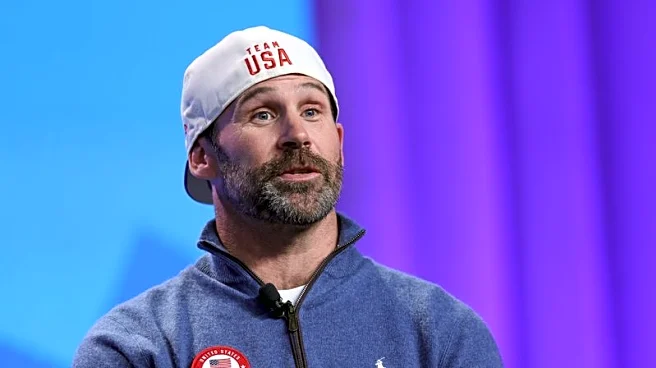What's Happening?
Belgian designer Glenn Martens, known for his work with Y/Project and Diesel, has expressed concerns about the influence of social media on the fashion industry. In a discussion with Imran Amed, founder and CEO of Business of Fashion, Martens highlighted how the industry's focus on quick visual consumption has led to a superficial understanding of fashion. He emphasized the importance of storytelling and craftsmanship, which are often overshadowed by the fast-paced nature of social media. Martens, who has a background in various roles within the fashion industry, believes that understanding every aspect of the business is crucial for effective leadership. At Diesel, he has worked to reconnect the brand with its core values, emphasizing its founding spirit of joy and cheekiness. Martens is also pushing for more inclusive fashion shows, such as Diesel's upcoming Spring/Summer 2026 show, which will take place in the streets of Milan, allowing public participation.
Why It's Important?
Martens' critique of social media's impact on fashion highlights a significant shift in industry dynamics. The emphasis on quick, superficial content can undermine the depth and craftsmanship that are essential to fashion design. This trend affects not only designers but also consumers, who may miss out on the rich narratives and intricate details that define high-quality fashion. By advocating for a return to storytelling and craftsmanship, Martens is challenging the industry to prioritize substance over style. His approach at Diesel, focusing on core brand values and inclusive shows, could set a precedent for other brands seeking to engage more meaningfully with their audiences. This shift could influence public policy around media consumption and impact how fashion brands strategize their marketing and engagement efforts.
What's Next?
Martens' initiatives at Diesel, including the public fashion show in Milan, suggest a move towards more democratic and inclusive fashion experiences. This approach may inspire other brands to rethink their engagement strategies, potentially leading to a broader industry shift towards inclusivity and community involvement. As Martens continues to balance his roles at Diesel and Maison Margiela, his influence could drive further changes in how fashion brands connect with their audiences. Stakeholders, including designers, marketers, and consumers, may need to adapt to these evolving dynamics, focusing on deeper engagement and storytelling rather than quick visual hits.
Beyond the Headlines
The deeper implications of Martens' critique involve the ethical considerations of social media's role in shaping public perceptions of fashion. The pressure for instant gratification can lead to a loss of authenticity and depth in creative industries. By advocating for a return to storytelling and craftsmanship, Martens is addressing the cultural shift towards superficiality and encouraging a more thoughtful approach to fashion consumption. This perspective may resonate with consumers seeking authenticity and depth in their fashion choices, potentially influencing long-term industry trends.











